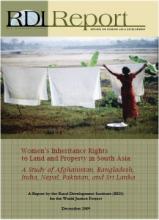Land Library Search
Through our robust search engine, you can search for any item of the over 73,000 highly curated resources in the Land Library.
If you would like to find an overview of what is possible, feel free to peruse the Search Guide.
/ library resources
Showing items 1 through 9 of 26.The need to achieve the Millennium Development Goals (MDGs) has raised the profile of social sector investments in Africa and other developing countries.
"Using survey data from the Upper East region of Ghana collected in 2005, the paper evaluates the household- and community-level factors influencing women’s and men’s decisions to participate in off-farm activities, either in the off-farm labor market or in local community groups, and the relatio
"In 1993, India introduced quota-based political reservations for women in rural areas with the objective to promote gender equality in human development by making rural service provision and local governance inclusive and responsive to the needs of women.
Since 2003, economic growth in Nigeria has been strong. Annual GDP grew by 9.1 percent per annum between 2003 and 2005 and by 6 .1 percent per annum between 2006 and 2008. Much of this growth can be attributed to the non-oil economy which has grown rapidly.
Drawing on a household survey collected in eight woredas in seven Ethiopian regions in 2009, as well as on qualitative fieldwork in four of the eight woredas, this paper provides analysis of agricultural extension delivery in Ethiopia.
[From the editorial] This issue of Feminist Africa seeks to explore the interconnections among economic liberalisation policies, land and resource tenures, and labour relations in the structuring of gendered livelihoods in sub-Saharan Africa.
This is a 2009 study undertaken by the Rural Development Institute, now Landesa, and authored by Elisa Scalise.
Poor rural women are among the most vulnerable people in El Salvador, where the Reconstruction and Rural Modernization Programme was launched in 2003 to aid areas stricken by earthquakes two years earlier. Women’s land tenure was not initially a central theme of the programme.
[via UN-HABITAT] GLTN considers gender as a critical cross-cutting theme in the work on promoting pro-poor, large-scale land tools (for more information on GLTN see www.gltn.net).





